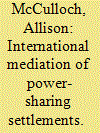| Srl | Item |
| 1 |
ID:
162434


|
|
|
|
|
| Summary/Abstract |
Power sharing is largely accepted among scholars and policy-makers as a potentially effective mechanism for building peace in the aftermath of violent ethnic conflicts and self-determination disputes. Although the operation of power sharing may be prone to ongoing challenges and even political crises arising from the legacy of the conflict, international actors continue to promote power-sharing arrangements to manage self-determination and other ethnopolitical conflicts. This article investigates the normative and instrumental reasons why third-party mediators (on behalf of international organizations and/or states) turn to power-sharing strategies during peace negotiations. It considers the reasons why third-party mediators promote power sharing when its maintenance is likely to depend on their ongoing commitment and governance involvement. We argue that mediators draw from four different perspectives in their support of power-sharing settlements: international law, regional and internal security, democracy and minority rights, and a technical approach where mediators focus on the mechanics of power-sharing designs. The article draws on in-depth semi-structured interviews with officials from the United Nations and the European Union working for the organizations’ respective mediation units as well as documentary analysis of official mediation documents.
|
|
|
|
|
|
|
|
|
|
|
|
|
|
|
|
| 2 |
ID:
162499


|
|
|
|
|
| Summary/Abstract |
Since the EU has expanded its common security focus in the 1990s, this important regional organisation has become the most frequent mediator in low-level civil conflicts worldwide. Under what conditions is the European Union (EU) likely to become involved in mediation in civil conflicts? Is the participation in mediation only explained by the EU's bias toward its near abroad, or is the EU more strategic? Some scholars have suggested that the EU's regional bias for its near abroad is the key explanation for the onset of EU mediation, but we propose that the reality of EU mediation presents a more nuanced story. We posit three explanations based on mediator bias: regional bias, economic bias, and normative bias. Overall, we argue that the EU will mediate in civil conflicts that are in its near abroad, but also where the EU has economic bias and where the EU can exercise its normative power in highly intractable conflicts. We test our hypotheses using statistical analysis of the UCDP low-level civil conflicts data from 1993 to 2004 and Civil War Mediation data from 1974 to 2005. We find strong support for our hypotheses, determining key factors that reveal the EU's strategic onset of mediation.
|
|
|
|
|
|
|
|
|
|
|
|
|
|
|
|